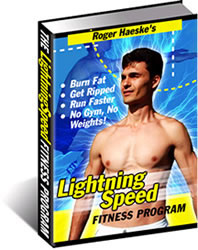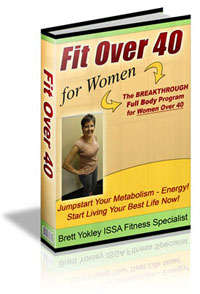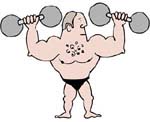L-Arginine dosage is supposed to help as a growth hormone secretagogue. Research, however, is all over the map. GH levels vary depending on several factors, as summarized in these studies.
.
.
.
L-Arginine Dosage Studies
Is L-arginine really a growth hormone releaser? Take a look at the following studies. Different results seem to contradict one another.
Note the highlighted background for the main point of each study below.
The Good
Growth Horm IGF Res. 2005 Apr;15(2):136-9. Epub 2005 Jan 26.
Growth hormone responses to varying doses of oral arginine.
Collier SR, Casey DP, Kanaley JA.
Department of Exercise Science, Syracuse University, 820 Comstock Avenue, Room 201, Syracuse, NY 13244, USA.
Intravenous (IV) arginine invokes an increase in growth hormone (GH) concentrations, however, little is known about the impact of oral arginine ingestion on the GH response.OBJECTIVE: The purpose of this study was to determine the dose of oral arginine that elicits an optimal GH response and to determine the time course of the response.
DESIGN: Eight healthy males (18-33 years – 24.8+/-1.2 years) were studied on 4 separate occasions. Following an overnight fast at 0700 h, a catheter was placed in a forearm vein. Blood samples were taken every 10 min for 5 h. Thirty minutes after sampling was initiated, the subject ingested a dose of arginine (5, 9 or 13 g) or placebo (randomly assigned).
RESULTS: Mean resting GH values for the placebo, 5, 9 and 13 g day were 0.76, 0.67, 2.0 and 0.79 microg/L (n=6), respectively. Integrated area under the curve was not different with 13 g (197.8+/-65.7 min microg/L), yet it increased with 5 and 9 g compared with the placebo (301.5+/-74.6, 524.28+/-82.9 and 186.04+/-47.8 min microg/L, respectively, P<0.05). Mean peak GH levels were 2.9+/-0.69, 3.9+/-0.85, 6.4+/-1.3 and 4.73+/-1.27 microg/L on each day for the placebo, 5, 9 and 13 g days.
CONCLUSION: In conclusion, 5 and 9 g of oral arginine caused a significant GH response. A 13 g dose of arginine resulted in considerable gastrointestinal distress in most subjects without augmentation in the GH response. The rise in GH concentration started approximately 30 min after ingestion and peaked approximately 60 min post ingestion.
The Bad
Appl Physiol Nutr Metab. 2011 Jun;36(3):405-11. Epub 2011 May 16.
The acute effects of a low and high dose of oral L-arginine supplementation in young active males at rest.
Forbes SC, Bell GJ.
Faculty of Physical Education and Recreation, University of Alberta, Edmonton, AB T6G 2H9, Canada. scforbes@ualberta.ca
L-arginine (2-amino-5-guanidinovaleric acid) is a conditionally essential amino acid. Intravenous (IV) administration of l-arginine invokes a large metabolic (nitrate/nitrite (NO(x))) and hormonal (growth hormone (GH), insulin-like growth factor 1 (IGF-1), and insulin) response; however, research examining oral l-arginine supplementation is conflicting, potentially owing to dose. The purpose of this study was examine a low and high dose of oral l-arginine on blood l-arginine, NO(x), GH, IGF-1, and insulin response. Fourteen physically active males (age: 25 ± 5 years; weight: 78.0 ± 8.5 kg; height: 179.4 ± 4.7 cm) volunteered to be in a randomized, double-blind, repeated-measures study. Following an overnight fast, an IV catheter was placed in a forearm vein and a resting blood sample was drawn at ?0800 hours. Each subject was then provided 1 of 3 treatment conditions (placebo, low (0.075 g·kg(-1) of body mass), or high (0.15 g·kg(-1) of body mass of l-arginine)). Blood samples were drawn at 30, 60, 90, 120, and 180 min after consumption. l-arginine plasma concentrations significantly increased (p < 0.001) to a similar level at any time point in both the low- and high-dose conditions; there was no change over time in the placebo condition. There was no significant difference between conditions for NO(x), GH, IGF-1, or insulin. Based on these findings, a low dose of l-arginine was just as effective at increasing plasma l-arginine concentrations as a high dose; however, neither dose was able to promote a significant increase in NO(x), GH, IGF-1, or insulin at rest.
(Example L-arginine dosage for a 90 kg man [i.e., 198 lbs] would be 6.75 g per day on the low dose and 13.5 g per day on the high dose.)
The Maybe
J Strength Cond Res. 2010 Apr;24(4):1082-90.
Arginine and ornithine supplementation increases growth hormone and insulin-like growth factor-1 serum levels after heavy-resistance exercise in strength-trained athletes.
Zajac A, Poprzecki S, Zebrowska A, Chalimoniuk M, Langfort J.
Department of Sports Training, Academy of Physical Education, Katowice, Poland. a.zajac@awf.katowice.pl
This placebo-controlled double-blind study was designed to investigate the effect of arginine and ornithine (arg and orn) supplementation during 3-week heavy-resistance training on serum growth hormone/insulin-like growth factor-1/insulin-like growth factor-binding protein 3 (GH/IGF-1/IGFBP-3), testosterone, cortisol, and insulin levels in experienced strength-trained athletes. The subjects were randomly divided between a placebo group (n=8) and the l-Arg/l-Orn-supplemented group (n=9), and performed pre and posttraining standard exercise tests with the same absolute load, which consisted of the same exercise schedule as that applied in the training process. Fasting blood samples were obtained at rest, 2 minutes after the cessation of the strength exercise protocol, and after 1 hour of recovery. The resting concentrations of the investigated hormones and IGFBP-3 did not differ significantly between the study groups. In response to exercise test, all the hormones were elevated (p < 0.05) at both time points. Significant increases (p < 0.05) were observed in both GH and IGF-1 serum levels after arg and orn supplementation at both time points, whereas a significant decrease was seen in IGFBP-3 protein during the recovery period. Because there was no between-group difference in the remaining hormone levels, it appears that the GH/IGF-1/IGFBP-3 complex may be the major player in muscle tissue response to short-term resistance training after arg and orn supplementation.
Likely Interpretation
The most effective dose according to the first study was 9 g per day. The second study had a gap between 6.75 and 13.5 g per day (for my body size, anyway), and saw no boosting effect on GH at either level. It missed the 9 g per day that was found to be effective in the first study. These scientists!
Finally, as I would expect, the truly best way to boost the effects of any L-arginine dosage requires exercise, notably intense resistance execise. No surprise there. This variable was confounded somewhat by combining L-arginine with L-ornithine, which is supposed to enhance the effects of L-arginine.
By the way…
The best books that I know of for showing you how to stay fit with quick, simple, at-home workouts are the Lightning Speed Fitness Program by Roger Haeske and the Fit Over 40 for Women by Brett Yokley. Roger and Brett also throw in lots of bonus books on diet, exercise, and lifestyle when you purchase their books. Click on images below for details.


.
.
.
.
.
.
.
.
.
.
.
.
.
.
.
.
.
.
.
All the best in natural health,
Dr. D

